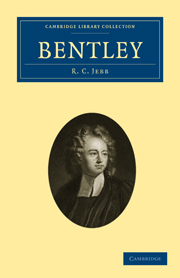Book contents
- Frontmatter
- PREFATORY NOTE
- Contents
- CHAPTER I EARLY LIFE. THE LETTER TO MILL
- CHAPTER II THE BOYLE LECTURES
- CHAPTER III LEARNED CORRESPONDENCE. THE KING'S LIBRARIAN
- CHAPTER IV THE CONTROVERSY ON THE LETTERS OF PHALARIS
- CHAPTER V BENTLEY'S DISSERTATION
- CHAPTER VI TRINITY COLLEGE, CAMBRIDGE
- CHAPTER VII BENTLEY AS MASTER OF TRINITY
- CHAPTER VIII LITERARY WORK AFTER 1700.—HORACE
- CHAPTER IX OTHER CLASSICAL STUDIES. — TERENCE. — MANILIUS. — HOMER
- CHAPTER X THE PROPOSED EDITION OF THE NEW TESTAMENT
- CHAPTER XI ENGLISH STYLE. EDITION OF PARADISE LOST
- CHAPTER XII DOMESTIC LIFE. LAST YEARS
- CHAPTER XIII BENTLEY'S PLACE IN THE HISTORY OF SCHOLARSHIP
CHAPTER IV - THE CONTROVERSY ON THE LETTERS OF PHALARIS
Published online by Cambridge University Press: 07 September 2010
- Frontmatter
- PREFATORY NOTE
- Contents
- CHAPTER I EARLY LIFE. THE LETTER TO MILL
- CHAPTER II THE BOYLE LECTURES
- CHAPTER III LEARNED CORRESPONDENCE. THE KING'S LIBRARIAN
- CHAPTER IV THE CONTROVERSY ON THE LETTERS OF PHALARIS
- CHAPTER V BENTLEY'S DISSERTATION
- CHAPTER VI TRINITY COLLEGE, CAMBRIDGE
- CHAPTER VII BENTLEY AS MASTER OF TRINITY
- CHAPTER VIII LITERARY WORK AFTER 1700.—HORACE
- CHAPTER IX OTHER CLASSICAL STUDIES. — TERENCE. — MANILIUS. — HOMER
- CHAPTER X THE PROPOSED EDITION OF THE NEW TESTAMENT
- CHAPTER XI ENGLISH STYLE. EDITION OF PARADISE LOST
- CHAPTER XII DOMESTIC LIFE. LAST YEARS
- CHAPTER XIII BENTLEY'S PLACE IN THE HISTORY OF SCHOLARSHIP
Summary
William Wotton'sReflections on Ancient and Modern Learning (1694) give the best view of a discussion which greatly exercised the wits of the day. ‘Soon after the Restauration of King Charles II.,’ says Wotton, ‘upon the institution of the Royal Society, the comparative excellency of the Old and New Philosophy was eagerly debated in England. But the disputes then managed between Stubbe and Glanvile were rather particular, relating to the Royal Society, than general, relating to knowledge in its utmost extent. In Trance this controversy has been taken up more at large. The French were not content to argue the point in Philosophy and Mathematicks, but even in Poetry and Oratory too; where the Ancients had the general opinion of the learned- on their side. Monsieur de Fontenelle, the celebrated author of a Book concerning the Plurality of Worlds, began the dispute about six years ago [1688], in a little Discourse annexed to the Pastorals.’
Perrault, going further still than Fontenelle, ‘in oratory sets the Bishop of Meaux [Bossuet] against Pericles (or rather Thucydides), the Bishop of Nismes [Flechier] against Isocrates, F. Bourdaloue against Lysias, Monsieur Voiture against Pliny, and Monsieur Balzac against Cicero. In Poetry likewise he sets Monsieur Boileau against Horace, Monsieur Oorneille and Monsieur Molière against the Ancient Dramatic Poets.’
Sir William Temple, in his ‘Essay on Ancient and Modern. Learning’—published in 1692, and dedicated to his own University, Almae Matri Cantabrigiensi—was not less uncompromising in the opposite direction.
- Type
- Chapter
- Information
- Bentley , pp. 40 - 63Publisher: Cambridge University PressPrint publication year: 2010First published in: 1882



